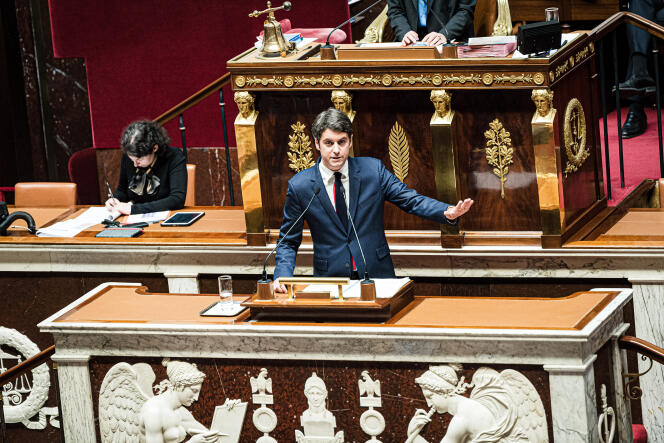


In an hour and twenty minutes of speaking before the Assemblée Nationale, Prime Minister Gabriel Attal was not always able to drown out the uproar from the left of the chamber, on Tuesday, January 30. Three weeks after his appointment, and at the height of a farmers' protest movement, the prime minister delivered his government policy statement "despite the shouting." His mother and sisters, who were present in the gallery, looked on, along with other persons close to him.
Born "in 1989, the year of the bicentenary of the Revolution," as he pointed out, the prime minister, wearing a blue tie with a single thin red strip on a white shirt, spoke amid the charged atmosphere of the lost illusions of his generation, which had "believed that liberal democracy and universal progress would triumph on their own" – only to see "the opposite happen." In contrast to this generation, which "doubts its identity," the 34-year-old expressed his "confidence" in the future. The successive crises do not mean "the end of everything, but the transition from one world to another," he asserted. He added that when some "want to see a Bermuda triangle, I see our Cape Horn, because we know where we want to go."
With four months to go before the European elections, the prime minister defined an electoral target. He made a priority of speaking to the middle class, "those French people in between (...) who have the feeling that decisions are taken without them, and that they always benefit the same people." These are people who "are not asking for the moon," but who risk "giving in to temptations that would only lead to chaos, division and collapse," he said.
Designed to counter the rise of Marine Le Pen's far-right Rassemblement National (RN), Attal's roadmap could be summed up in three ideas: "unlocking," raising workers above the minimum wage, and "debureaucratizing." Unlocking access to housing, at a time when the sector is in crisis; and access above all to "work" – that word was used 40 times in his speech – because "nobody is asking for a right to laziness in our country." The prime minister smiled, his phrase mocking Green MP Sandrine Rousseau, who used that concept, without mentioning her name.
Determined to "make it so that those who go to work can live from their labor and always earn more than those who don't," Attal promised to reform low wages as early as the next budget. He is also committed to keeping President Emmanuel Macron's promise of a new €2 billion tax cut for the middle class.
You have 55% of this article left to read. The rest is for subscribers only.
